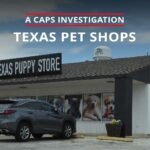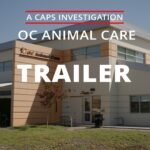CAPS Works with Reader’s Digest
February 1999 Issue has Special Report on “Scandal of America’s Puppy Mills”
CAPS played an important role in the February 1999 Reader’s Digest article, “The Scandal of America’s Puppy Mills.” We worked closely with the writer, Bill Ecenbarger, and provided information on pet shops and puppy mills, the USDA and the AKC. We also provided interview contacts and arranged for Mr. Ecenbarger’s visit to a horrendous Missouri puppy mill that sold a very sick puppy to a broker who dealt with Shake A Paw.
Ecenberger interviewed Dr. Donald Allen, a CAPS board member. Dr. Allen disagreed with statements made by Melvin Nolt, a commercial breeder in East Earl, PA. Mr. Nolt claimed that a lot of the criticism about puppy mills “comes from city people who don’t understand animals or farming.” He claimed that these people “get overly emotional about dogs, and they don’t understand that dogs are different from people.” Dr. Allen replied, “Sure, dogs are different from people. But dogs are different from livestock, too, because they’re destined to live someone’s home. It’s difficult to house-train a pup from a mill because it’s used to voiding wherever it wants. And it’s failed to bond with people.”
The article stated that consumer demand keeps the puppy mills in business. Part of this demand comes from the idea that the “best” dogs are purebred. Dr. Allen said, “For the past half-century, the American Kennel Club (AKC) has driven home the propaganda that a purebred dog is better than a mixed breed. In doing so, it has created a popular demand for pedigreed dogs, and puppy mills have sprung up to supply this demand at the retail level.” According to the article, an AKC policy statement maintains that the AKC is opposed to “random, large-scale breeding of dogs solely for commercial purposes.” The article noted, however, that the AKC collected $26 million in registration fees in 1996 alone.
Under a heading aptly titled “Short, Sad Tale,” Mr. Ecenbarger told the story of Oscar, a Shake A Paw puppy. For liability reasons the article didn’t mention the names of the pet shop, broker or breeder. Susan Lively, whom CAPS found through the Ohio Attorney General’s Division of Consumer Protection, works for American Airlines and saw Shake A Paw puppies waiting in the baggage area for six hours. During this time, she fell in love with one of the puppies, a Dachshund. When the store owner finally came to claim the puppies, Ms. Lively said she wanted to buy the Dachshund. The next day, she purchased the puppy at the Dublin, OH Shake A Paw for $449. When she took him home, he vomited. The following day, Thanksgiving, she drove with Oscar to her parents’ house, two hours away. That night, he started vomiting again. Oscar stayed at the veterinarian for five days before dying from parvovirus. Ms. Lively spent $375 in veterinary bills.
The store credited Ms. Lively’s credit card, but she received no reimbursement for the veterinary bills. Ms.Lively told CAPS she had to fight the owner just to get the purchase price credited. In a letter to the Ohio Attorney General’s Office, the owner alleged that “Susan played a role in the demise” of the puppy because she transported him to her parents’ house shortly after purchasing him. Perhaps if the owner had been to the breeding facility where Oscar was born, she wouldn’t have asserted that Ms. Lively had anything to do with the puppy’s death. The Dublin Shake a Paw went out of business in June 1997.
Oscar was born on September 29, 1996 at Surritte Kennel in West Plains, MO. Carolyn and Donald Surritte have a USDA Class A license. The Surrittes sold Oscar to Thunder River, a Class B facility (broker) in Elk Creek, MO. Thunder River sold Oscar to the Dublin Shake A Paw. In the fall of 1997, a CAPS investigator visited Surritte Kennel and Thunder River as part of an investigation of breeders and brokers who deal with Shake A Paw franchises.
Surritte Kennel was off a gravel county road. The property consisted of a farmhouse surrounded by junk and other debris and trash. Scattered beneath the trees were hutch style cages as well as runs with concrete floors. A huge building housed female dogs that had whelped or were about to whelp. The conditions were so deplorable, the CAPS investigator couldn’t believe the Surrittes had federal and state licenses. The investigator did not see anyone caring for the animals and no one answered the door. He visited the Surritte puppy mill the following week with a Hartford news 8 crew. They took undercover footage to use in a two-part expose that aired in November 1997. A dead Dachshund was in plain view. The reporter told the Surritte’s daughter about the dead dog. The daughter, who was carrying a young child on her hip while tending to puppies in cramped, dank cages inside a mobile home, seemed quite indifferent about a dead dog being in one of the cages.
CAPS has copies of 13 USDA inspection reports for the Surrittes from April 1995 to December 1998. These reports show a pattern of habitual non-compliance with the Animal Welfare Act.
An inspection report for 12/29/98 stated that the licensee performed a cesarean section on a Dachshund in a surgical area that was “dirty, littered with equipment such as computers, was dusty and aseptic conditions could not be maintained.” This dog had given birth to eight puppies. The Surrittes admitted to the inspector that they had performed c-sections on four other dogs. It is shocking that the USDA allows licensees to perform surgical procedures, let alone in less than sterile conditions. The report also noted inadequate bedding, broken housing structures, dirty enclosures (feces and moldy food), sharp broken wires protruding from hutches, improper use of identification tags, and faulty record keeping for acquisition and disposition of animals. The inspector also stated that a small white puppy with its front paws severely chewed by the mother needed veterinary care by the next day.
On July 28, although the television was on and the phone line was busy, the inspector stated that one was available to accompany him on an inspection. The next day, Carolyn Surritte refused an inspection. The July 15 inspection report stated “The black dog (NO ID) Â… must been seen by the attending veterinarian to treat the large lump on the neck and mucous in the eyes.” The inspector could not find this dog during an inspection on August 4. On July 15, the inspector also ordered the removal of two decaying carcasses from the cat housing area.
The Surrittes obtained a USDA license in 1992. It wasn’t until November 1998 that the USDA finally charged the Surrittes with numerous violations of the Animal Welfare Act. An administrative law judge in Springfield, MO will hold a hearing on July 27. The USDA requested a $28,000 fine and license revocation. In February 2000, the Surrittes agreed to a civil penalty of $2,000. They had to divest themselves of all regulated animals under their control and surrender their license. They were also disqualified from ever becoming licensed again.




